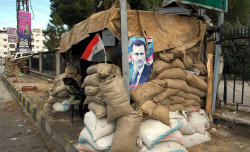 |
 |
Syrian soldiers warned daily of sectarian dangers, defectors say

Read this story at the Los Angeles Times
The Syrian army fell from 220,000 troops to about half that strength last fall because of defections and battlefield losses, according to the International Institute for Strategic Studies' annual Military Balance assessment. Defections since then have further weakened the army.
The government can now depend on the loyalty of about 50,000 regular troops, including the mainly Alawite Special Forces, Republican Guard and elite 3rd and 4th divisions, according to the institute.
They are buttressed by the shabiha, who have violently cracked down on dissent since the beginning of the Syrian uprising in 2011 and have been accused of committing some of the most brutal acts of the war. Also growing in strength are "popular committees," made up of minorities who have taken up arms to protect their districts from opposition fighters, according to a recent report from the Institute for the Study of War, a Washington, D.C.-based think tank.
The pro-Assad militias and the popular committees coordinate with and receive direct support from the Assad government, as well as Shiite Iran and the Lebanese-based Shiite militia group Hezbollah, according to the report "The Assad regime: from counterinsurgency to civil war."
Motivated by a fear of retribution from a mostly Sunni opposition, soldiers and militiamen have formed an ultra-nationalist and mostly Alawite force with the common goal of survival.
"Whether or not the regime falls, the country will split into rival cantons governed by militias," Joseph Holliday, author of the report, wrote in an email. "The scale of population displacement ... means that the country may have been heterogeneous in the past, but everyone has clustered around co-religious/sectarian groups over the past year."
Even within the military, divisions are becoming more pronounced. Air force Col. Yousef Al-Assad, a MIG-23 pilot who defected in autumn from the Dumair military airport in the suburbs of Damascus, flew no missions during the current conflict. As a Sunni, he was banned from going near the planes. Only pilots from certain minority sects were allowed to fly, he said.
"They would tell us clearly, 'You Sunnis are not trusted.'" he said. "And we were not included in many of the operations meetings."
In the past, distinguishing between sects was subtle, he said. Now it has become overt in an effort to sow hostility and distrust between Syrians, he said.
Read this story at the Los Angeles Times
Copyright © 2013 Los Angeles Times